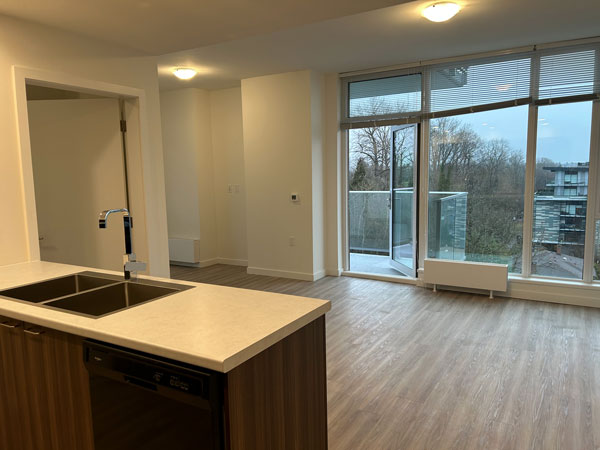I always enjoy taking a telephone call from journalist Peter Caulfield. He's genuinely interested in the topics he writes about and eager to learn more. I discussed 'inclusionary zoning' with Peter for approximately 45 minutes while driving across Vancouver Island to attend an affordable housing conference in Tofino, which I reported on in a previous blog. we would have spoken longer, but I eventually was out of cellular range!
138 new affordable homes officially open in west side Vancouver - Peter Caulfield
S.U.C.C.E.S.S. and the Tikva Rental Housing Society recently celebrated the official opening of Dogwood Gardens, a new affordable housing project that is part of the City of Vancouver’s Cambie Gardens development at West 59th Avenue and Cambie Street.
The event was attended by Queenie Choo, CEO of S.U.C.C.E.S.S. (United Chinese Community Enrichment Services Society), Anat Gogo, executive director of Tikva (“hope” in Hebrew) and local dignitaries, including Vancouver Mayor Ken Sim.
“We applaud the work of S.U.C.C.E.S.S. and Tikva, who have helped expand options for culturally appropriate housing across our city,” said Sim.
Dogwood Gardens, which contains 138 affordable homes, is part of a partnership with the City of Vancouver.
S.U.C.C.E.S.S., which is the leaseholder of Dogwood Gardens, and Tikva are co-managing the project.
Of the 138 new homes, 34 are studio, 35 are one-bedroom, 41 are two-bedroom and 28 are three-bedroom units.
Dogwood Gardens will have a mix of rents, including 14 shelter-rate units.
Ten units are reserved for people in the province’s Supporting Tenants, Enabling Pathways (STEP) program, which helps them transition out of supportive housing.
Dogwood Gardens will have amenity space, a children’s play area, parking and storage.
Tikva has been allocated 30 units and has filled them all since it began moving in tenants in October 2022.
S.U.C.C.E.S.S. is in the process of interviewing prospective tenants for its 108 units.

It has been operating and managing affordable housing projects across Metro Vancouver since 2008, in collaboration with BC Housing and local municipalities.
Tikva has been providing access to “innovative and affordable housing solutions,” primarily for Jewish individuals and families, since 2007.
Tikva operates 128 units in five housing developments in Vancouver and Richmond and a rent subsidy program that provides temporary financial assistance to private market renters.
Dogwood Gardens is the first of four affordable housing buildings being developed at Cambie Gardens, which will ultimately provide 540 new affordable homes.
Dogwood Gardens was developed through Vancouver’s inclusionary zoning policy, which provides social housing to the City as a Community Amenity Contribution (CAC) by the developer.
CACs are in-kind or cash contributions by property developers when Vancouver City Council grants development rights through rezoning.
The rationale for CACs is that the demand on city facilities increases with rezonings because new residents and new employees enter the area.
To lessen the impact on the community, CACs add and expand city facilities.
Ryan Bigelow, managing director of Vancouver’s non-market housing development and operations, says there have been several projects where the city has obtained social housing units as in-kind CACs.
“Over the last 10 years, the city has secured over 3,000 social housing units as in-kind CACs,” said Bigelow. “Approximately 600 of these units are now in operation.”
Dogwood Gardens is the first completed affordable housing project at Cambie Gardens.
“There is an additional turnkey social housing building that was secured with an agreement, as a condition of the rezoning,” said Bigelow. “There are also two ‘dirt sites’ (land) which will be transferred to the city to build an additional 179 social housing units.”
Michael Geller, Vancouver planner and real estate developer, says inclusionary zoning started in the U.S. but since then has become widespread.
“One of the benefits of this approach is socioeconomic mixing,” said Geller. “That can be good for everyone, especially for those in social housing.”
Another benefit is that it doesn’t rely on senior government funding.
“It’s a wonderful way to produce affordable housing,” said Geller. “But the non-market housing depends on the market housing in order to go ahead.”
Experience has shown, Geller says, the successful use of inclusionary zoning to create social housing is tied to overall market conditions.
“In a rising market it works well,” he said. “But if demand falls off, it can become very difficult to make the market-oriented projects work financially, and developers might decide not to proceed with their projects. In that case the non-market housing doesn’t get built, either.”
Geller says there are other ways to create affordable housing.
“One of the best is to give rent subsidies to people who are most in need and let them choose where they want to live,” he said. “There’s a debate among housing planners on the relative merits of subsidizing housing supply versus subsidizing housing demand. Should money be given to developers or to consumers?”
Geller says the best solution is to go back to the 1970s when the federal government made money available to non-profit organizations to build rental and co-op housing projects.

No comments:
Post a Comment